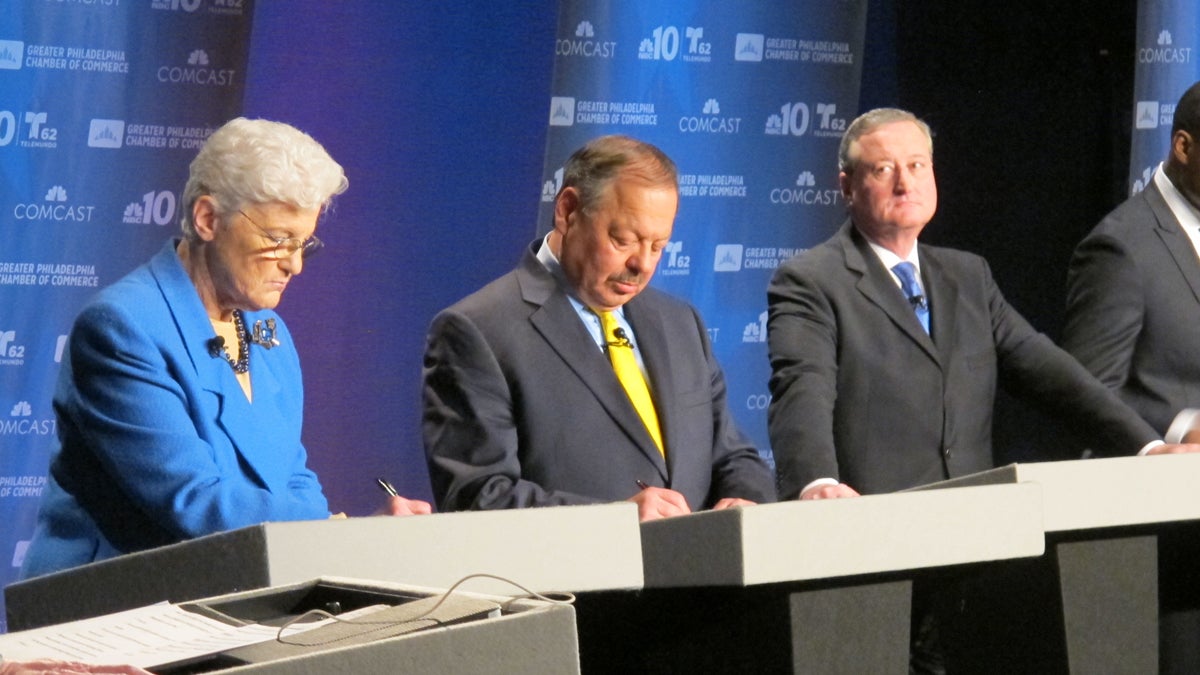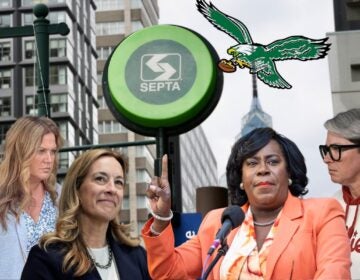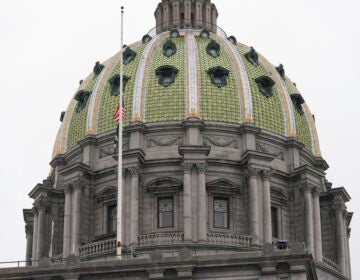Lynne Abraham collapses during Philly mayoral debate [video]

Mayoral candidate Lynne Abraham, flanked by rivals Nelson Diaz and Jim Kenney, takes notes Tuesday night during the debate. She later collapsed on the stage. (Katie Colaneri/WHYY)
Philadelphia mayoral candidate Lynne Abraham fainted Tuesday night during the first televised debate of the campaign.
About 10 minutes into the event, as state Sen. Anthony Williams answered a question about school funding, Abraham suddenly fell to the floor. Moderator Jim Rosenfield from NBC10 stopped the debate as her opponents helped her to her feet.
A doctor treated her offstage and said she was suffering from low blood pressure.
“While I was just standing there looking over at Tony, the lights went out,” Abraham told reporters afterwards. “I was really anticipating tonight’s debate because I think there’s so much at stake for the city. You know this is the city that I love and want to do the best for it.”
It was expected to be an important night for Abraham since unlike her opponents Anthony Williams and Jim Kenney, she has not benefitted from TV ads supporting her campaign.
The debate, hosted by the Greater Philadelphia Chamber of Commerce, continued without Abraham and touched on a wide range of topics from poverty to the role of big campaign donors.
Rosenfield asked Williams about the three pro-charter “Main Line millionaires” who have funded a major media campaign promoting his candidacy and whether outside donors are helping or “unduly influencing” the race.
Williams blamed the city’s strict campaign finance limits.
“Outside forces are now lining up because of the rules that we’ve created making it very difficult for all of us to run these ads,” he said, noting he is the only candidate who has been able to fund his own TV ad.
Williams also wrongly accused Kenney of being supported by “dark money.”
A federally-registered Super PAC, largely funded by local labor unions, funded a TV spot for Kenney that began airing last month. Unlike private nonprofits, PACs have to report who their donors are and therefore, are not considered “dark money.”
“I don’t know exactly who it is that’s funding my commercials, but I understand that they are working people,” Kenney said, “They’re not billionaires.”
The candidates were also asked about the prospect of turning Philadelphia into an energy hub — a plan being pushed by businesses leaders who want to build a pipeline to the city from Pennsylvania’s natural gas fields.
All of the candidates support that plan, except former state Sen. Milton Street who dismissed the question.
Doug Oliver, a former Philadelphia Gas Works spokesman, said it would help bring manufacturing back to Philadelphia, a city that has been “left out” of the state’s shale gas boom.
“I think just the existence of Marcellus Shale has kept gas prices so low that we as a city can do a much better job of attracting manufacturing jobs to the city,” Oliver said.
While supporting the hub concept, Nelson Diaz worried it would hurt air quality.
“My problem is that we can’t continue to have more emissions and more pollution in the city,” he said.
WHYY is your source for fact-based, in-depth journalism and information. As a nonprofit organization, we rely on financial support from readers like you. Please give today.




